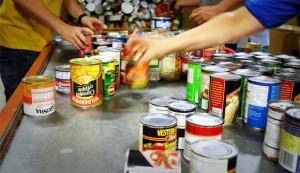
Sadida Ahmed and her husband Malik used to have a reasonable life. Yes, they rented from a private landlord, and because this is London they paid a lot for the ‘privilege’ – £1,200 a month. But they both used to work – Malik had spent 15 years working full-time as a security guard. According to Malik, 44, ‘everything was fine’. But now they are struggling, and they came into the Greenwich food bank pushing their two daughters of just 17 months and six months in the pram. They became homeless when the landlord gave them notice to quit. The rent had become too high for the couple to afford. They were rehoused by Lambeth Council ‘out of borough’, so they ended up living in a council property in the Royal Borough of Greenwich.
Before the family moved in they say they were told that the council property was furnished – but it turned out to be unfurnished. So one of the babies doesn’t have a cot and the couple are sleeping (and sitting) on an old mattress in the living room. They do have a cooker – but no washing machine.
Malik is looking for work and Sadida, 28, is four months pregnant. What little money they have – Malik’s Job seeker’s Allowance, child tax credit and child benefit – doesn’t go very far. Having small children is very expensive at the best of times. Money needs to be found for nappies, formula milk and baby clothes, on top of the usual household bills.
Here Malik describes the family’s difficult circumstances.
He says: ‘I have £113 a week and I have to pay bills and pay for the babies’ food. I’m really struggling at the moment and I don’t know what to do and that’s why I’m here. I ran out of food. I’m not getting enough money to look after my family at the moment. I’m keen for work and looking for a job. When a job comes I will be fine, but at the moment it’s really hard. I have two small babies of six months and 17 months, and my missus she’s pregnant too. Shes 14 weeks plus. It’s really hard to cope with.’
Harpinder Singh, a local councillor in Woolwich happened to be at the food bank, and met the couple. Malik has promised to get in touch with him. Harpinder, who has spent some time in this food bank recently, says that the situations he encounters might be expected ‘in the Far East or Africa, but we shouldn’t see them here’. He says he recently heard of a young family with no electricity or gas at home – ‘and then it becomes a safeguarding issue as they can’t cook food’. The next step in that case was to refer the issue to staff at the council, for an immediate response’.
He believes that the Royal Borough of Greenwich ‘has a willingness to help’. He says that before the most significant changes to the benefits system kicked in, ‘we identified people who were most likely to be affected by the changes – we identified them early and tried to help them get back into work’. He said that ‘to his knowledge we have not had to move people out of borough – not like in Tower Hamlets or Westminster’. He added: ‘It’s about using your resources – we’ve done well (at helping the vulnerable on the limited resources we have.’
Councillor Singh believes that its going to get even harder to help the most needy. The Local Government Association has warned that support for vulnerable people in crisis will either have to be scaled back or scrapped completely in almost three-quarters of council areas from next April when government stops funding for Local Welfare Assistance schemes. A survey of local authorities suggests ‘councils will hugely struggle to maintain current levels of help for vulnerable people when government scraps the £347 million Local Welfare Assistance fund next year’, according to the LGA, and ‘the ending of government funding for councils’ emergency support schemes comes on top of a 40 per cent reduction in local government funding over the course of this Parliament’.
Meanwhile, in the increasingly surreal world of London housing, London Mayor Boris Johnson is said to be about to approve plans today for ‘affordable housing’ flats that could cost tenants up to £2,800 a month to rent. He’s not fighting a one-man crusade either. According to a letter in the Guardian yesterday from chairs of the former crown estate residents’ associations, Peabody, a charity whose founding purpose is to improve the conditions of the poor and needy in London, is ‘also advertising homes it bought from the crown estate in 2011 at ‘affordable’ rents that no key worker can afford’. The former chairs have called on Peabody to ‘scrap this ludicrous rent model and honour its commitments to us and to its founding principles’.
When Malik finds a job, what are the chances that he can move his young family into a home in a location of their choice, at a level of rent that still enables them to lead a decent life?
Is that too much to ask?
